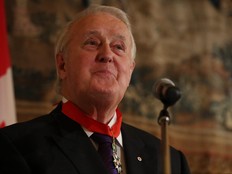KINSELLA: If Canada's long relationship with U.S. is over, then what now?
Canadians – now in the midst of truly existential election campaign – are entitled to hear a clear answer to this from our Prime Minister

Article content
Mark Carney looks grave.
“The old relationship we had with the United States based on deepening integration of our economies and tight security and military cooperation is over,” the Prime Minister of Canada says, and his words hang in the air like static. He pauses.
“It’s clear the U.S. is no longer a reliable partner. It is possible that with comprehensive negotiations, we could reestablish an element of confidence, but there will be no going backwards.”
And with that, a unique relationship that has endured for 158 years – a relationship that has survived war, pandemics and terror attacks – came to an ignoble end. With a whimper, not a bang, at a hurriedly-convened press conference in Ottawa. Called to answer to Donald Trump’s destructive and reckless tariffs on the auto industry.
Carney’s words went around the world.
“Canada PM Mark Carney says old relationship with US ‘is over’,” BBC headlined their report. “Old US-Canada relationship is ‘over,’ warns Canadian prime minister,” said CNN‘s bulletin. “Canadian Prime Minister Mark Carney says ‘old relationship’ with US ‘is over’ amid tension over Trump tariffs,” said Fox News.
Partisan Liberals gleefully celebrated Carney’s statement, posting online that he looked at sounded prime ministerial. And that much was true: Carney did look and sound like Prime Minister, for the first time in the very short time he has been in the job.
But it wasn’t anything to celebrate. It was deeply, profoundly sad. And, importantly, Carney’s declaration will be difficult – verging on impossible – to walk back. For him or a successor.
Carney’s Liberals will argue, and have, that their leader’s statement merely acknowledges the obvious reality. When Trump is calling us the 51st state, when he is mocking us and our people, when he is threatening to use “economic force” against us, it would be an abdication of leadership to pretend that little has changed. That, in a sense, is what Pierre Poilievre has done, and it has hurt his electoral prospects. The Conservative Leader is losing because he seems to think it’s business as usual.
But Carney’s statement whips the pendulum to the opposite extreme. To declare our relationship with the United States “over” – to state the Americans are “no longer a reliable partner” – will be difficult, or impossible, to retract. The Liberal Leader’s statement was not ambiguous.
In the middle of an election campaign in which Donald Trump is the ballot question, however, Carney’s words will boost his party’s popularity. Canadian nationalism is surging, from coast to coast to coast. Young and old, East and West, conservative and liberal: if there is anything that unites us, it is our conviction that we want to remain Canadians.
But now that our Prime Minister has declared our historical relationship with the United States of America is finally over, what should be done about it? What, in particular, is Mark Carney going to do about it?
His words impose a duty on him, as Prime Minister, to map out Canada’s post-America future. Pipelines, oil and gas and minerals to market. Diversifying trade, and finding new markets. Strengthening our military and security, and building new alliances for intelligence-sharing.
What is Mark Carney’s plan to construct new alliances to achieve these objectives, to replace the position formerly held by America in our lives? We don’t know.
This is politics, of course, and Carney’s solemn words could all be a bit of a ruse. Everyone expected his first telephone conversation with Trump to be an unmitigated disaster, with the U.S. President mocking Carney afterwards on his Truth Social, like he used to do with Justin Trudeau.
Instead, Trump swiftly issued a statement calling their conversation “extremely productive.”
“We agree on many things,” he said.
Trump also pledged to meet with Carney soon to work on files “that will end up being great for both the United States and Canada.”
So, perhaps, Carney’s statement had the desired effect. Perhaps the auto tariffs won’t happen now. Perhaps Trump will respond later, critically, as he often does with friend or foe. With him, all of that and more is possible.
In the meantime, however, we Canadians – now in the midst of truly existential election campaign – are entitled to hear a clear answer to this from our Prime Minister:
Now that you’ve said our 158-year-old relationship with America is over, what do we do next?














Postmedia is committed to maintaining a lively but civil forum for discussion. Please keep comments relevant and respectful. Comments may take up to an hour to appear on the site. You will receive an email if there is a reply to your comment, an update to a thread you follow or if a user you follow comments. Visit our Community Guidelines for more information.